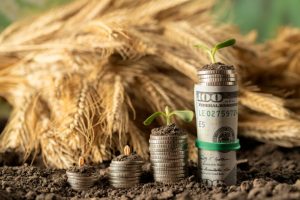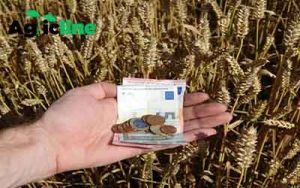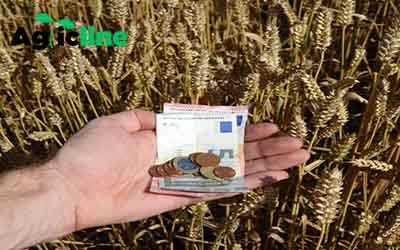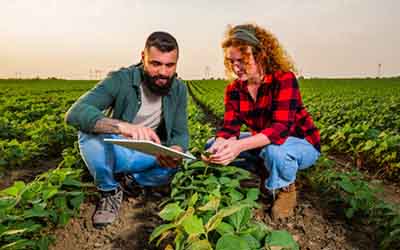In the ever-evolving landscape of global markets, agriculture remains a cornerstone, integral to sustaining life and powering economies.
As the world’s population continues to surge, projected to reach nearly 10 billion by 2050, the demand for food and sustainable agricultural practices is at an all-time high.
This pressing need presents a unique array of investment opportunities, promising not only financial returns but also the chance to contribute to global food security and environmental sustainability.
Agriculture investment encompasses a broad spectrum of opportunities, from direct involvement in farming operations to technological innovations aimed at enhancing productivity and sustainability.
These investments are critical in addressing the challenges of climate change, resource scarcity, and the increasing demand for food.

The Overview of Agriculture Investment Opportunities
- Global Demand for Food and Sustainability
- Portfolio Diversification
- Technological Innovation
- Rising Environmental Consciousness
- Economic Stability and Growth Potential
Global Demand for Food and Sustainability
At the heart of agriculture’s appeal is the undeniable fact that food is a basic human necessity.
The global population’s relentless expansion translates into an ever-increasing demand for food, a demand that is expected to rise by nearly 70% by 2050.
This growth is not just in quantity but also in quality, with a growing emphasis on sustainability, organic produce, and environmentally friendly farming practices.
Investing in agriculture offers a unique opportunity to contribute to meeting these global challenges, providing both ethical satisfaction and financial returns.
Portfolio Diversification
Agriculture investments offer an excellent avenue for diversification. Unlike many other investment sectors, agriculture often exhibits low correlation with the general market movements, providing a buffer against volatility.
Technological Innovation
The agricultural sector is on the brink of a technological revolution, with innovations aimed at increasing efficiency, productivity, and sustainability.
Precision farming, agricultural drones, vertical farming, and genetically modified crops are just a few examples of how technology is transforming agriculture.
These advancements not only promise to meet the growing global food demand more effectively but also offer exciting investment opportunities.
By investing in agri-tech, investors can be part of pioneering solutions that have the potential for significant financial returns and a lasting positive impact on the planet.
Rising Environmental Consciousness
The increasing awareness of environmental issues and climate change has propelled sustainable agriculture practices to the forefront.
Consumers are more conscious than ever about the origins of their food and its impact on the environment, driving demand for organic produce and sustainable farming methods.
Investments in sustainable agriculture can cater to this growing market segment while promoting practices that conserve resources, reduce carbon footprints, and enhance biodiversity.
Economic Stability and Growth Potential
Agriculture investments can provide economic stability, thanks to the essential nature of the sector.
Despite technological advancements and societal changes, the fundamental need for food remains unchanged, offering a level of demand security unmatched by many other sectors.
Types of Agriculture Investment Opportunities
Agriculture investment opportunities are diverse, offering various entry points for investors with different interests, expertise, and risk appetites.
- Direct Investment in Farming
- Agri-Tech Startups
- Commodities Trading
- Agricultural Funds and ETFs
- Crowdfunding and Peer-to-Peer Lending
Direct Investment in Farming
Direct investment in farming involves purchasing or leasing land to engage in crop production or livestock rearing.
This hands-on approach allows investors to have full control over the agricultural processes, from planting to harvest.
- Crop Production
Investing in arable land for the cultivation of crops such as wheat, corn, soybeans, and rice. This option requires knowledge of agricultural practices and market trends.
- Livestock Rearing
Raising animals for meat, dairy, or wool. This includes cattle, sheep, poultry, and more. It requires understanding of animal husbandry and market demands.
Agri-Tech Startups
The burgeoning field of agri-tech represents a modern approach to agriculture, focusing on innovation to solve traditional farming challenges. Investment opportunities in this area include:
- Precision Agriculture: Technologies that optimize field-level management regarding planting, crop care, and harvesting.
- Agricultural Drones: Unmanned aerial vehicles used for crop monitoring and spraying, offering precision and efficiency.
- Vertical Farming: Indoor farming techniques that increase yield per square foot, using less water and land.
Commodities Trading
Agricultural commodities trading involves buying and selling products like grains, meat, and dairy on commodities markets.
This can be done through futures contracts, which are agreements to buy or sell at a future date at a predetermined price.
Agricultural Funds and ETFs
For those looking for a less hands-on approach, agricultural funds and Exchange-Traded Funds (ETFs) offer a way to invest in a diversified portfolio of agricultural stocks or commodities.
Crowdfunding and Peer-to-Peer Lending
Crowdfunding platforms and peer-to-peer lending sites allow investors to fund small-scale farmers or agricultural projects with smaller capital outlays.
- Social Impact
This investment type offers the chance to support small farmers and sustainable projects, potentially yielding financial returns alongside social and environmental impact.
The Risks Of Agriculture Investment
While agriculture investment offers considerable opportunities, it also comes with its set of challenges and risks.
Market Volatility and Price Fluctuations
Agricultural commodities are subject to significant price volatility due to a variety of factors, including weather conditions, pest infestations, geopolitical tensions, and changes in trade policies.
These fluctuations can significantly impact the profitability of agricultural investments.
For instance, an unexpected surplus in crop production can lead to a sharp decline in prices, while a drought can cause prices to spike.
Environmental Risks
Climate change poses a significant risk to agriculture, affecting crop yields, water availability, and the prevalence of pests and diseases.
Extreme weather events, such as floods, droughts, and hurricanes, can devastate crops and livestock, leading to substantial financial losses for investors.
Political and Regulatory Risks
Agricultural policies and regulations can significantly affect the viability of agricultural investments.
Changes in subsidies, import-export restrictions, and environmental regulations can alter the economic landscape for certain crops or farming practices.
Operational and Management Risks
Direct investments in farming operations require effective management and operational expertise.
Challenges such as disease outbreaks in livestock, crop failure, and labor shortages can severely affect productivity and profitability.
Mitigating Risks of Agriculture Investment Opportunities
Despite these risks, there are strategies investors can employ to mitigate potential downsides:
- Diversification
- Research and Due Diligence
- Sustainable Practices
- Insurance and Hedging
- Professional Advice
Steps to Getting Started with Agriculture Investment
Embarking on agriculture investment requires careful planning and consideration. Whether you’re a seasoned investor diversifying your portfolio or a newcomer attracted by the sector’s potential for growth and sustainability, the following steps can guide you through the process of getting started with agriculture investment.
- Define Your Investment Goals and Strategy
Determine your financial goals, including desired returns, investment horizon, and risk tolerance.
Agriculture investments can range from stable, lower-risk options like farmland real estate to higher-risk, higher-reward ventures like agri-tech startups.
Consider whether you want your investment to contribute to sustainable practices, support local communities, or address global challenges like food security.
- Conduct Thorough Research
Understand the current trends, challenges, and opportunities in the agricultural sector, including technological advancements, regulatory changes, and environmental considerations.
Explore the various types of agriculture investments, from direct farming and agri-tech to commodities trading and agricultural funds. Evaluate the potential risks and returns associated with each option.
- Seek Expert Advice
Consulting with industry experts, financial advisors, and agricultural economists can provide valuable insights into the agricultural market and help refine your investment strategy.
They can offer advice on risk management, potential investment opportunities, and strategies for achieving your financial and impact goals.
- Start Small and Diversify
Especially for those new to agriculture investments, starting with a small, manageable investment can allow you to gain experience and understanding of the sector without overexposing yourself to risk.
Diversification across different types of agricultural investments and geographic regions can help mitigate risks and stabilize returns.
- Monitor and Adjust Your Investments
Agriculture is a dynamic sector influenced by many variables, including climate conditions, market demand, and technological innovations.
Regularly monitoring your investments and being prepared to adjust your strategy in response to market changes or new information is crucial for long-term success.
- Embrace Sustainability
With increasing global focus on sustainability and responsible investing, consider opportunities that align with these values.
Investments in sustainable agriculture practices, organic farming, and agri-tech innovations that address water usage, soil health, and carbon footprint can offer competitive returns while contributing to a more sustainable future.
- Legal and Financial Due Diligence
Before finalizing any investment, conduct thorough due diligence to understand the legal, financial, and operational aspects.
This includes reviewing contracts, assessing financial health and forecasts, and understanding any regulatory compliance requirements.
Top agricultural investors in Africa
Here’s a list of some of the top agricultural investors in Africa everyone ought to know.
- African Agricultural Capital Fund (AACF)
- AgDevCo
- Phatisa Food Fund 2 (PFF2)
- African Development Bank (AfDB)
African Agricultural Capital Fund (AACF)
Managed by Pearl Capital Partners, AACF is focused on investing in small and medium-sized enterprises (SMEs) in the agricultural sector across East Africa.
They aim to generate social impact alongside financial returns by improving agricultural productivity and market access.
AgDevCo
A specialist investor in African agribusinesses, AgDevCo invests to grow sustainable and impactful agribusiness.
They manage a portfolio across multiple countries in Africa, aiming to create jobs and link smallholder farmers to markets.
Their approach includes providing more than just capital, focusing on long-term partnerships for growth and impact.
Phatisa Food Fund 2 (PFF2)
Phatisa is an African private equity fund manager operating across the continent. PFF2 focuses on investing in the entire food value chain – from farming to fork – emphasizing sustainable development and profitability.
Phatisa’s investments span various sectors, including inputs, production, processing, and retail.
African Development Bank (AfDB)
Though not exclusively an agricultural investor, AfDB plays a significant role in financing agricultural development projects in Africa.
They provide funds for infrastructure, agribusiness, and projects aimed at increasing food security and rural income.

My final thought on agriculture investment opportunities
The future of agriculture is being shaped by several key trends, including the rise of technological innovations in farming, the shift towards sustainable and regenerative agriculture practices, and the evolving consumer preferences towards plant-based diets and food traceability.
These trends not only offer new avenues for investment but also underscore the importance of sustainability and resilience in the global food system.
For investors looking to venture into this sector, the path forward involves a careful balance of opportunity seizing and risk management.
Starting with a clear understanding of one’s investment goals and strategy, conducting thorough research, and seeking expert advice are foundational steps.
Recommendations
Best 5 Money making agriculture business ideas
7 Best Methods of pest control in agriculture
5 Top Challenges faced by farmers in India



